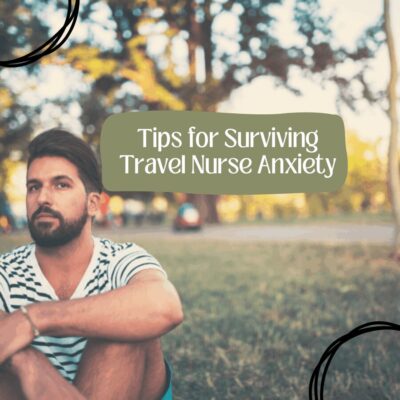Travel nursing means starting a new job every 13 weeks, give or take. This can cause travel nurse anxiety to rise. We see many posts in our Facebook group about nerves before the first assignment. And many veteran travel nurses say that they still have those same first-day jitters after many assignments. So, how do you handle the jitters and travel nurse anxiety? Below, you will find some of the tips fellow travel nurses had in our Facebook group.
Surviving Travel Nurse Anxiety:

Think Positive
Keeping a positive mindset will help you get through. Going into the assignment with a positive outlook will affect your assignment. Many people believe that your thoughts genuinely affect your actions, and it is true. So keeping a positive mindset will help to ease some of your anxiety even if the positive mindset is that it is only 13 weeks, and then you are on to your next location.
Be Positive in Your Skillset
Most travel nurses have at least 2 years of experience. You have developed a great skill set and learned many things in that time. Your skillset won’t change just because you are going to different facilities. Things may not be done exactly like you are used to, but hey, you may just learn something new with each new facility you work at.
Become familiar with the facility, unit, and parking prior to your first day
Members mentioned taking time prior to your first day to get accustomed to the area, the facility, your home unit in the facility, and the parking situation. Some assignments charge for parking. Knowing that before your first day will help with your anxiety. One member said she asks for an orientation of the unit before her first day. This would give you time to ask questions about where things are, codes for doors, and just any questions you may have. Getting to know the facility prior is a great idea too. It gives you a chance to get to know where things are in the facility.
Remember, you are the same nurse at any facility
The biggest takeaway from the comments on the post was that at the end of the day, you care for patients and nurse the same regardless of the location. So, just because your hospital is changing, you are still the same nurse and will give the same care.
We hope you found these tips for coping with travel nurse anxiety helpful. Do you suffer from travel nurse anxiety? How do you cope? Do you have any tips to share with fellow travel nurses? Comment them below.
Are you looking for your next travel nurse assignment? Click here to view our job board. Do you need housing for your assignment? Click here to search our housing page.

























